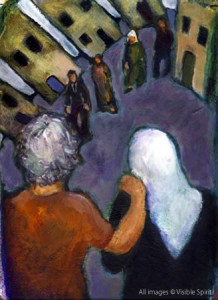Bridging Chasms – by Bob Faris
Theological Reflection – Sunday, Sept 29, 2013
Bob Faris is Associate Minister at St. Andrew’s Church on King Street in Toronto where he has primary responsibility for Outreach ministries and Adult Education. He spent six years teaching at the Seminário Unido de Ricatla near Maputo in Mozambique. His doctoral thesis on the protestant churches in Mozambique and the liberation struggle will soon be published. He also worked for over fifteen years with two Canadian ecumenical organizations, the Canadian Churches’ Forum for Global Ministries and the Churches’ Council on Theological Education in Canada.

There was a rich man who was dressed in purple and fine linen and who feasted sumptuously every day. And at his gate lay a poor man named Lazarus, covered with sores, who longed to satisfy his hunger with what fell from the rich man’s table; even the dogs would come and lick his sores. The poor man died and was carried away by the angels to be with Abraham. The rich man also died and was buried. In Hades, where he was being tormented, he looked up and saw Abraham far away with Lazarus by his side. He called out, ‘Father Abraham, have mercy on me, and send Lazarus to dip the tip of his finger in water and cool my tongue; for I am in agony in these flames.’ But Abraham said, ‘Child, remember that during your lifetime you received your good things, and Lazarus in like manner evil things; but now he is comforted here, and you are in agony. Besides all this, between you and us a great chasm has been fixed, so that those who might want to pass from here to you cannot do so, and no one can cross from there to us.’
Luke 16:19-26
Many people were a bit more than surprised to hear the story of the rich man and Lazarus being read at my father’s funeral. It is not a usual passage on such occasions, at least in small town Ontario. But that was my father’s request and so it was read and reflected upon.
My Dad had always been a compassionate person. He learned about helping others in the farming community in which he grew up. Of course there was a strong sense of independence among farmers who worked hard to build up an operation that would sustain a family and produce food for others near and far. However, there was also a strong sense of interdependence. If a neighbour was in need, you helped out. If someone was having a hard time, you did what you could to help them get through. And for my Dad at least, there was a sense that it was important to go the extra mile for someone who seemed to have a bigger challenge or obstacle in their way.
Both my parents had a strong sense that what they had in life was a gift from God. They shared their gifts and their money in their community and particularly in the church. They knew the Bible well and stories like the rich man and Lazarus and Father Abraham from Luke’s gospel had shaped their understanding of the call upon their lives to share what they had been given with others. They emphasized to anyone who would listen how important it was to support the “Mission” side of the church envelope, that is the part that supported the work of the church beyond the bricks and mortar and Sunday School supplies of their local congregation. If people would only share, the world would be a better place and would be more like God intended it to be. And of course it would be.
In the late 1980’s, my Dad went for the first time to Central America with a group of young people from the Presbyterian Church to help build a school in Costa Rica. In addition to growing up on a farm, he had run his own building construction business and so had many skills that were needed for such a project. He wanted to share these skills with people in need. He got a bit frustrated with some of the young people who wanted to spend as much time talking with people in the local community about the challenges they faced as they did mixing concrete.
The longer he stayed, though, the more he realized that the problems in the country were not only with the individual people or even the communities where he was offering to help, but also and more pointedly with the bigger concerns in the region that made it extremely difficult to move forward with improving the lives of the people that were becoming his friends. The group travelled into Nicaragua where they witnessed firsthand the impact of the on-going war, fueled by arms and ideology that originated far from the people with whom they met. When I met with my Dad at Christmas that year, I was very surprised to hear him talking about the need to challenge the global arms trade and the many ways in which policies and practices in our part of the world made a better life almost impossible for people in other parts of the world.
There was a great chasm between the wealthy and the poor, the haves and the have-nots, the privileged and the marginalized that was created by the economic, military and political systems over which most people had little control. It became his mission to tell others about this while there was time to do so and to do what he could to work with others to bridge that chasm. He even continued to tell this to anyone who would listen at his funeral. A little twist to the story. A surprising word of grace. Thanks be to God.
